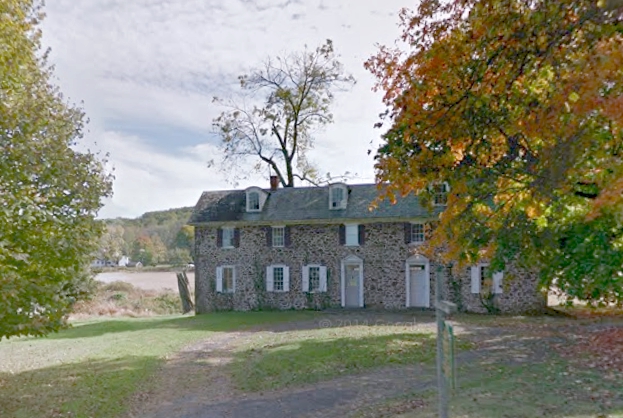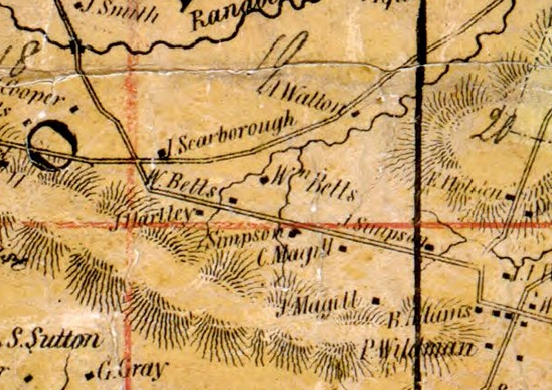While cataloging bound manuscripts for the Bucks County Historical Society I came across this story in a scrapbook from the Lahaska area dating to the 1890s. It contained the following newspaper clipping, in which Martha Kenderdine “Mattie” Reeder recounts stories from her grandmother’s childhood:
Reminiscences of “When Grandma Was Young.”
————————————————
A Paper Read Before the Farmers’ Institute at Lansdale by Miss Mattie Reeder, of New Hope, on Wednesday, March 10th, 1897.
————————————————
It was a dreary day in early November. The scudding clouds had fought a triumphant battle with the wintry sunshine. Now the first snow was falling. The old, stone farm house, safe sheltered from the north winds by the surrounding hills and forest, was never known to close its door upon the tired traveler. To-night there seemed an extra bustle within its walls. A little stranger had that day arrived. “The baby is a girl,” the radiant nurse announces. “Another little girl, and I have so many little girls,” sighed the pale mother. And this was grandma’s welcome to the world. It was not a very warm one and at first grandma debated long the question, should she stay? Perhaps it was the beauty of the dancing flames in the great fireplace, or the tender mother love which cherished her, or maybe the awkward caresses of her blue-eyed brother that at length determined her. So the sickly baby grew into a rosy, toddling girl, whose life was as joyous and free as the song birds about her. And it is fragments from this girl[‘s] life of long ago that I will try to tell.
It was a large family that dwelt in the spacious farm house. The first-born, a son, was looked upon with awe by all the youngsters. He was treated with almost the respect they showed to father. Then came a list of daughters who went by the name of “the girls.” And lastly grandma and her darling scapegrace* brother, who were known until both married as “the children.” This brother and sister, “the children,” the love that bound them so closely together, makes it impossible to tell the story of one life without also telling that of the other.
Grandma’s one great trial of her childhood’s days was that she could not be a prim and quiet little maid like her sisters. She would run and romp, climb the tallest trees and whistle. Her little feet from spring to fall were innocent of shoes and stockings, except on First-days when it was her turn to go to meeting. Then, in a household of so many daughters there could not be a different dress and bonnet for each one. One costume did for many. So poor little grandma would find herself in a gown, either too long or too short and with shoes that clumped or else cruelly pinched her feet. But not withstanding this her day to go to meeting was always longed for and when over remembered fondly.
It was ever wonderment to her grandchildren that grandma showed an unconquerable aversion to a yellow cat. One day the secret transpired. At the farm house, it appears, pet cats and kittens were tabooed. But one yellow kitten proved so engaging that the little fluffy thing crept right into the hearts of the children. When their secret was discovered the mandate was issued, the kitten must die and they must kill it. It did seem cruel but to disobey father or mother was never thought of. Grandmother and her brother held a sorrowful consultation. At last he had a brilliant inspiration. The kitten should be Arnold, the traitor, and be hung. Arnold deserved the fate and they, he argued, (not withstanding their friendly up bringing) would be doing a worthy act. Grandma gave a dubious sigh of assent and followed her leader. Arnold was taken to the woods with a tow string fixed firmly around his neck. The limb was chosen, the deed all but done, when “you wicked children!” screamed a shrill voice behind them. Turning they saw flying toward them an old woman, whose gray hair flew out behind her. She had thrown her bundle of sticks aside and shook her crutch in a menacing manner as she swooped upon them. “The Witch of the Woods,” they gasped in terror and fled. This old woman had long been known to them by fame. She lived alone in her wretched hut and how she existed none knew. But because she was old and poor and lonely she was called a witch and the name clung to her and helped make her shunned. She knew she was feared and her temper was sound, but she saved that kitten.
Sometime after this grandma chanced to be alone in the forest when she again encountered the witch, gathering her daily bundle of faggots. With scant ceremony the old woman bade the little girl help her carry wood. Afraid to obey, afraid to disobey, grandma stood. A second command, sharper than the first, made her hasten to assist. Arrived at the witch’s hut she found her reward in a seed cake. There were no black cats to be seen, not black bag to hide little girls in and no superfluous broom-sticks. It was only the home of a poor, lame, old woman, and when a little kindness was shown her she proved not ungrateful. Perhaps it was pity or maybe it was the seed cake that made grandma from that time a visitor to the old Witch of the Woods.
It was considered a misfortune by the children (and it was a misfortune) that they had no grandma. Other little people had and boasted to them and put on superior airs. Their pride was touched. Grandma pondered long on this perplexing problem; then it was solved. We would adopt a grandma, and no less a person was selected than the Witch of the Woods. This solution was rejected by her brother. He even teased her, calling her “The Little Witch of the Woods,” but she was not to be deterred.
One of the older sisters had been sent to boarding school. With the knowledge there acquired she was expected to teach the children and she did so with credit. A summer school was held in a room over the wagon house and to her little people come from far and near. In the winter the big boys come and then it was an unwritten law that no girl should attend. Grandma was quick at her studies and was loath to leave. She timidly petitioned to be allowed to attend the winter session. But her father’s stern “What does thee want among a parcel of big boys” effectually silenced her. Nevertheless, her brother went and grandma secretly pored over his books and kept pace with him.
One time when the father and mother attended yearly meeting her brother was taken with them. It was their first separation, and grandma felt it keenly. But the joy of the return! She learned then she had not been forgotten. With his scanty, hard-earned pennies her brother had bought her a china mug. And enclosed by a wreath of flowers were the words “For My Favorite.” As long as she lived this mug had a place among grandma’s greatest treasures. But all this time grandma was growing. She was no longer “The Little Witch of the Woods.” She was learning the art of spinning, of churning golden butter, and the mystery of cooking was no mystery to her. In all household affairs the careful mother trained her daughter. And she was such an old, old fashioned mother that she taught her to look forward to the time when she should be married, and helped form her so that she would perform the duties of a wife nobly and well. There was already a goodly store of linen, spun by grandma’s girlish fingers and laid carefully away for her “outset.” And as she sat by her wheel, spinning, spinning, many must have been the gorgeous day dreams of the coming of the prince. All the older girls were married, and her father jokingly had told her she must not ask for her outset for those three years. Then grandma was only dreaming, but at the end of those three years her father was seriously reminded of his joke.
Grandma’s brother had grown into a tall young man. He was something of a dandy and went to see the girls. Often his gay companions came to the old farm house. Neither their coming or their going troubled grandma.
She had not yet asked herself the question, “Am I a child or woman?” One day seeing her brother’s team drive in the door-yard, she left her work and ran to meet him. Too late, a strange young man, she saw, was with him. [And she] stood spell-bound for she looked upon her prince. Then she realized in one brief instant that her home-spun dress was old and faded. That her curly hair was dreadfully tumbled and oh, what should she do! She had on neither shoes nor stockings. At this crisis, without a word and with cheeks of crimson grandma turned and fled. But the prince had only seen her face.
This I think proves quite plainly nature had been very kind to grandma, since it took so little to make her charming. Still, great was the disgust of her brother. “What had made her behave so simple?” Alas! she did not know. “What would his friend think of the sister he had been so highly praising?” Grandma was silent, but she only wished she knew.
Meanwhile the father and the mother saw their daughter bud into a woman and they gave her the outfit suitable for a young woman of her day. To transform this merry girl into a stately lady they bought her one silk gown, a cotton print, a pair of long silk mit[t]s, a shawl and bonnet. And grandma over this modest wardrobe had just as many raptures as girls of to-day.
When she stood arrayed in her gown of silvery gray her thoughts wandered to the prince and she could not help sighing, “Oh! If he could only see me now.” But the prince did not forget her. He began to come quite often to see her brother. At least the brother thought so, and took upon himself all the entertainment, while the poor prince suffered torments. Demure grandma saw it all, but would not help him. But at last grandpa (Oh! the prince) by means of schemes the darkest and efforts mighty succeeded in escaping from this now tiresome brother. But when this poor deluded brother saw his friend walking with his sister he was blind no longer.
Then came grandma’s courting days. But of the long rides, the walks, the talks grandma and grandpa had together grandma would never tell me. She was growing old, she said, and it was all so long ago she could not remember. And that was the first and only time that I could not quite believe her.
*Scapegrace: a mischievous or wayward person; a rascal.
————————————————
The grandmother in question is Letitia Blackfan Betts. Her father Stephen Betts settled in Solebury in the late 1700s, and the Betts homestead remained in their family for more than a century. Letitia was born on November 11th, 1801, and grew up on her family’s farm on Stoney Hill Road. Her younger brother John, with whom she was so close, was born in 1804. Letitia married her suitor Joseph Eastburn Reeder at Buckingham Friends Meeting on April 11th, 1824. The farmhouse, which still stands today, was located between Stoney Hill and Aquetong Road.

